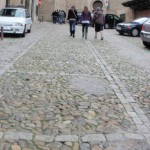Rocky Top Meets Barcelona
Post #1: Crabgrass Frontier 1-156
My first real experience and realization with the contrast of suburb and city was three years ago when I studied abroad in Barcelona, Spain. In hopes of improving upon my Spanish, learning about the Catalan culture and having a “home away from home” during my semester abroad, I chose to stay with a Spanish family during my time there. The usual expectation of different food, customs, and language had been on my radar for culture shock, but I never expected to encounter such a difference and true shock in actual living. Maybe I was naive or maybe at 20 years of age I thought I knew everything, but I never thought this culture shock would come from transportation, the arrangement of the city or my living quarters.
The first few realizations were the following:
- Our host parents live in the center of the city! We are close to all the bars, restaurants, plazas and even the beach!
- The apartment I will spend the next semester in is tiny. 4 girls, 2 host parents, a fat cat and a ridiculous amount of suit cases were already suffocating.
- City life means you walk places. Everything is nearby.
- City life also means you take the metro to anywhere not nearby. The red line was right outside our apartment, the Urgell stop to be exact.
- I know nothing about city living: my shoes aren’t made for walking a lot, I don’t know how to buy a metro card, and I don’t know how people live without a Walmart.
After a few days adjusting here were my additional thoughts:
- Our host parents were loaded compared to other host families. We had friends that lived 20 minutes outside of town. The size of your apartment didn’t matter, the proximity you were to the city did.
- To survive in the city you need supportive shoes.
- To survive on the metro you need to be fast, be aware and be open to cuddling up next to strangers, because EVERYONE rides the metro.
- Walmart doesn’t have anything on the little market down the street. I’ll skip big lines and coupons for that mercado any day.
So the initial culture shock (or should I say city shock) wore off with time, and I began to truly appreciate this new type of place to live. I soaked up all I could about the culture, the language and easily put on a pound a week with all the food I made time to appreciate. I had the typical study abroad experience full of fun memories, new friends, lots of traveling and an ungodly amount of money spent in just a few months.
In relation to this class and the past week’s reading, I should probably start discussing some major themes that I experienced as a Knoxville ‘burbs loving girl understanding why life is so different in Barcelona, and I’m assuming other urban cities. Here we go:
City folks are skinnier. Country folks are… well… not.
The fact that country people are bigger isn’t 100% correlated to the love of biscuits and gravy, but I believe, to the lack of getting lost on city streets. To survive in the suburbs you need a car. To survive in the city you need supportive shoes, a great ability to layer clothing (I went from freezing on the street to sweating in the metro in a matter of minutes), ability to walk a mile and not complain, because sometimes there just isn’t a metro stop close by and most importantly, the understanding that sometimes two feet can get you somewhere faster (and with less stress) than fighting a metro crowd. Due to our spoiled ways of the suburbs, many of my new study abroad friends and I would spend lots of time and money on the metro to avoid walking in the cold or even just walking in general. We were sad to realize that our first few days and weeks in Barcelona were spent mostly underground. We came to a new city to explore and see the sights, but didn’t want to put in the normal city effort to walk around. Sad realization that we quickly tried to change.
People value different things. Homes truly reflect that.
In Barcelona, apartments were small and families were close. The apartment was a place for families to spend time together. The city (your literal backyard and front yard) was your place for friends. Very rarely did anyone enter the apartment that wasn’t a family member. Anytime our host parents went to visit with friends they did it at a vacation home or a restaurant. I found this interesting, because back home we host dinner parties, invite friends over daily, and at least in my family, our family gatherings took place at vacation homes or restaurants. The time spent at our apartment in Barcelona was cherished, because our host parents made it such a sacred place. Yes, I do cherish my time in Knoxville with my family, but I wouldn’t say it is a sacred place. People run in and out. I can be at home with my dad for an entire day and never see or hear him due to the size and layout of our house. I found it ironic that in the suburbs family is important, but you must always have the big house and big yard to allow an escape for those family members. In Barcelona, family is important and the house you live in makes sure that you are always a stone’s throw away to the nearest sibling or parent. I don’t know if it is fair to say that in Barcelona family was more important, but it was a more respected concept in my opinion.
Transportation is everything.
I chose Barcelona as my study abroad location, because I love the Spanish language, but more importantly, I thought I would have perfect weather. The year that I study abroad is the the same year that Barcelona has a snow storm in over a decade. Convenient right? Well, this snow storm affected all of the city’s transportation. I remember there being talk about the metro closing, buses would be delayed and best part, school would be canceled! Like a typical snow day in the ‘burbs, the city basically shuts down if transportation can’t operate efficiently. Unlike the ‘burbs, transportation delayed or inhibited wasn’t something celebrated for a day off, but it really was a debilitating event. In a culture where you buy your day’s groceries on your way home from work, this meant you really might not have a stock pile of food at home. In a community where the littlest children ride the metro and bus on their own, this was a huge cause for concern. In a city where everyone walks, icy sidewalks made it a struggle for everyone to get home safely (I remember falling twice on the way home from school!). I never understood the importance of transportation (buses, trains and the metro) to a city until you witnessed an entire city in fear of being without it.
Pictures above: 1. Cobblestone roads do terrible things to your feet. 2. Small apartment means that you can high-five your roommate from anywhere in the bedroom. 3. Small apartments also mean that you can talk to your host mom from your bedroom window to the kitchen window as she hangs your laundry out to dry. 4. You can’t hide the fact that you are American when you consistently fall on the metro when it starts and stops. First metro ride (pictured here) I stepped on an old lady’s toe.





June 19, 2013@ 10:42 pm
Very nice observations. There actually is a whole area of research now that explores the relationship between the built environment and obesity. Much of the research has shown that denser, urban places have lower obesity rates than sprawled out places.